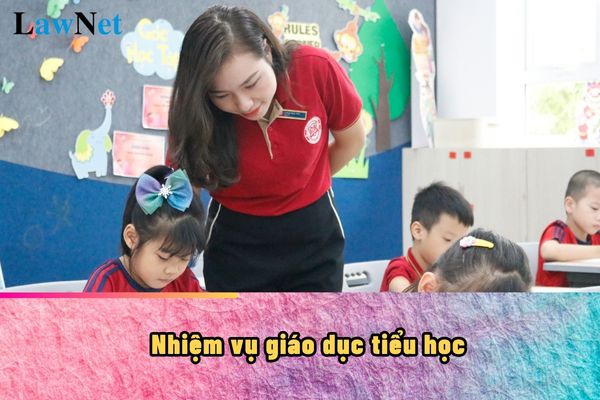What are the details of Primary education tasks on implementing solutions to ensure school safety for the school year 2024-2025 in Vietnam?
What are the details of primary education tasks on implementing solutions to ensure school safety for the school year 2024-2025 in Vietnam?
Based on Subsection 1 of Section B Official Dispatch 3898/BDGDT-GDTH 2024, the primary education tasks on implementing solutions to ensure school safety for the school year 2024-2025 are as follows:
- Maintain environmental hygiene in the school and ensure physical and mental health for students, staff, teachers, and administrative officers;
- Proactively develop flexible teaching plans adaptable to students and actual conditions to prepare for natural disasters or epidemics at local schools, based on assessments and lessons from previous school years; inspect, review, and reassess the quality of school facilities, plan and perform maintenance of facilities as required;
- Do not use facilities that have exceeded their usage period or are not safe until they are renovated, repaired, or upgraded.
- Continue to effectively implement tasks related to moral education, lifestyle, life skills for students, building school culture; social work, psychological counseling for students in schools, ensuring a safe, healthy, friendly educational environment, and preventing school violence.

What are the details of primary education tasks on implementing solutions to ensure school safety for the school year 2024-2025 in Vietnam? (Internet image)
Primary education tasks on Proactive and Flexible School Education Planning for the school year 2024-2025 in Vietnam
Based on Subsection 2 of Section B Official Dispatch 3898/BDGDT-GDTH 2024, the guidance for proactive, flexible school education planning and completion of the academic programs for 2024-2025 is as follows:
- Develop a school's education plan to proactively, flexibly implement and complete the academic program:
The Department of Education and Training directs educational institutions to organize the development of school education plans, teaching plans for subjects and educational activities, and lesson plans as required; allocate time efficiently for the implementation of the program ensuring scientific and pedagogical standards without putting pressure on students; flexibly organize teaching of subjects, educational activities suitable to the actual conditions of the locality, school, and student profiles, ensuring that by the end of the school year, students meet the program's requirements.
- Implement the general education program:
The Department of Education and Training directs educational institutions to implement the elementary level general education program as per the specialized guidance documents on primary education issued by the Ministry of Education and Training, specifically:
+ Ensure a 1 classroom/grade ratio, physical facilities, and student/grade ratio as per the elementary school regulations;
Ensure sufficient minimum teaching equipment as required[4]; achieve a ratio of 1.5 teachers/grade and a teacher structure to teach all subjects, educational activities, and organize two teaching sessions per day as required.
+ Implement compulsory subjects and educational activities, elective subjects as prescribed by the elementary level general education program;
Organize activities to reinforce students’ ability to complete the learning content, educational activities that cater to students' needs, interests, talents; activities to explore nature, society, culture, history, and local traditions.
+ Organize two teaching sessions per day, with no more than 7 periods per day, 35 minutes per period; implement minimum teaching schedules of 9 sessions/week with 32 periods/week;
Ensure reasonable distribution of educational content to help students complete study tasks, meet the program's required achievements; enable students to study elective subjects and participate in educational activities aimed at achieving comprehensive education objectives at the primary level;
The school timetable should be scientifically arranged, ensuring a reasonable ratio between teaching content and educational activities, appropriate time distribution, and scheduling within the school day and week suitable for primary students’ psychological development.
+ For primary schools not equipped to organize two teaching sessions per day, while ensuring the teaching of the required content and duration of compulsory subjects as per the program's requirements, primary schools should proactively identify content, choose appropriate forms of organization, allocate suitable time for elective subjects when conditions are met, and reinforce activities and other educational activities.
+ Develop a plan to organize boarding with suitable content and forms according to actual conditions, with consensus and voluntariness from students and parents, following the regulations and guidelines of the management authorities;
Boarding activities are organized during the time between morning and afternoon teaching sessions, contributing to training students in life skills, necessary competencies, qualities, discipline, self-service, responsibility, sharing, and affection; organizing boarding activities should be flexible, possibly including activities such as lunch, nap, play, and entertainment for students;
Organizing lunch and boarding must comply with safety and food hygiene regulations, ensuring nutrition and health for students.
+ Organize activities for students outside of official school hours based on students' needs and interests from after the official school hours until parents pick them up;
Based on students' needs and interests, activities can be organized in the form of clubs or using the school's physical facilities (library, playground, sports field, multi-purpose hall...) to create conditions for students to play and entertain themselves;
Organizing activities after official school hours in the form of club activities must be approved by the competent authorities.
Primary Education Tasks on Implementing Flexible Teaching Methods and Forms of Organization in Vietnam
Based on Subsection 7 of Section B Official Dispatch 3898/BDGDT-GDTH 2024, the tasks for primary education regarding the flexible implementation of teaching methods and forms of organization are as follows:
- Educational institutions decide on methods and forms of organizing educational activities, including teaching methods and forms of organization, to meet the goals and requirements of the educational program, ensuring quality and efficiency;
- Appropriately apply positive elements of advanced educational models and methods to improve educational quality and efficiency, especially innovating the organization of educational activities in the classroom; enhance practical experience and application of knowledge in real life;
- Flexibly integrate educational content at the primary level using appropriate forms according to the school's education plan.
Focus on innovating the content and forms of professional activities through class observation and lesson study;
Improve the quality and substance of lesson planning (lesson plans) to facilitate the effective implementation of teaching methods, teaching techniques, evaluation, teaching equipment, learning materials, focusing on developing students' qualities and competencies during teaching;
Avoid rigid and formulaic application in lesson planning and execution of teaching processes, making each lesson consist of learning activities with specific learning products that students must complete;
Flexible implementation methods to organize teaching that promotes students' self-study, initiative, and creativity; refer to televised lectures and the Ministry of Education and Training's shared digital resources to enhance teachers' professional skills.
- Implement digital transformation tasks in teaching and educational management at all levels following a specific roadmap, including the application of information technology to innovate teaching methods and forms of assessment; apply information technology in managing teaching processes and school governance.










- Vietnam: What is the sample outline of an essay on the analysis of expressions of national spirit in the Poem "Việt Bắc" for 12th-grade students? What patriotic qualities are required for 12th-grade students?
- Vietnam: What are your thoughts on the Poem "Tiếng ru" by To Huu? How many lessons are there in the 12th-grade Literature curriculum per year?
- What are the sample essays describing your grandfather for 5th-grade students in Vietnam? What are the assessment criteria for 5th-grade students in 2024?
- Vietnam: What are the sample social argumentative essays on social media etiquette for 10th-grade students? What Vietnamese knowledge do 10th-grade students learn?
- Vietnam: Why is the French Bourgeois Revolution considered the most thorough one? What learning outcomes are required for 11th-grade students after studying the bourgeois revolution?
- Vietnam: What is the atmosphere? What is the grade at which students are required to master the knowledge of the atmosphere in the History and Geography curriculum?
- Vietnam: Why does the phenomenon of day and night alternation occur on Earth? What is the grade at which students learn about the phenomenon of day and night alternation on Earth?
- What is the newest report template on distance education at the higher education level in Vietnam?
- Vietnam: What are the shortest sample expositions on Ba Den Mountain for 9th-grade students? What learning outcomes are required for the writing process in the 9th-grade Literature curriculum?
- In Vietnam, what does local time mean? What is the grade at which local time is taught in the History and Geography curriculum?

